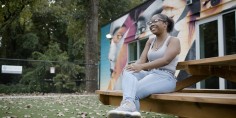The Endowment’s largest and boldest foray into place-based work is the Ready for School, Ready for Life (Ready Ready), a multi-year endeavor in Guilford County, N.C., to give every child a better chance at success in school and life. Working with Ready for School, Ready for Life, a leading early childhood organization, the goal is to improve individual and population-level outcomes among 55,000 children, prenatal through age 8.
“The comprehensive nature of place-based work — ranging from education to health care to parental support — is consistent with the latest research on improving well-being for children,” says Meka Sales, director of Special Initiatives at the Endowment. “Place-based efforts are uniquely positioned to reach all organizations, agencies and providers invested in building a stronger community.”
400-Page Plan
Collective planning is key to successful place-based efforts, giving communities a roadmap to follow while allowing space for adaptations.
In Spartanburg, the nonprofit Northside Development Group serves to encourage and manage the community’s redevelopment effort, which includes a mix of affordable and market rate housing, economic, educational, recreational, health and social opportunities for residents. A 400-page community-led transformation plan guides the work.
“The plan’s 18 goals are designed to honor the area’s rich history while creating the change the community would like to see,” says Michael Williamson, the organization’s CEO. “Coming in from the outside, I had never seen a master plan that’s been followed as closely as this one.”
Previously the community development project manager for the City of Greenville, S.C., Williamson has led Northside Development Group since March 2020. Before he stepped into the role, the community had decreased the number of dilapidated structures and launched a burst of building projects on once-abandoned lots.
“I can’t take the credit, but many of those 18 goals have already been met,” he says.
Later this year, for instance, construction will wrap up on a two-phase mixed-use commercial project that will serve as a new gateway to the community. The project includes offices for Northside Development Group, AccessHealth Spartanburg and BirthMatters, and a teaching clinic for VCOM (the Virginia-based Edward Via College of Osteopathic Medicine), which chose the vacant mill site across the street for its Carolinas Campus. Wofford College is using some of the space for its Community Sustainability Program. A rental housing development will feature 90 units.
Also opened in Northside is Harvest Park, a food hub with a café, an urban farm and a weekly farmers market. Outdoor recreational areas include the Butterfly Creek Park and Greenway. Just down the street is the Dr. T.K. Gregg center, completed in 2020 to provide community space, a fitness center and two pools.
‘Where Education is Valued’
At The Franklin School, a full-day, full-year early learning center, classrooms of children are delving into science, technology, engineering, art and math.
The $11.4 million center addresses the community’s limited access to quality childcare with both market-rate and affordable-care slots, including Head Start and Early Head Start. The school serves as a laboratory for students from the University of South Carolina Upstate to conduct research and learn about teaching practices.
The vision for Northside also focuses on The Cleveland Academy of Leadership, a local Title 1 school with about 420 elementary students.
“Returning the community to its full potential means creating the best opportunity for children to succeed as they move through the educational pipeline into adulthood,” Williamson says.
Bill Barnet, Spartanburg’s former mayor and board chair of the Northside Development Group (and a Duke Endowment Trustee), agrees.
“The goal for all this is the education of our children,” he says. “But the reality of our journey is creating an environment around the schools where education is valued, parents and children are healthy, residents feel safe, businesses want to invest, and where families can feel at home.”







